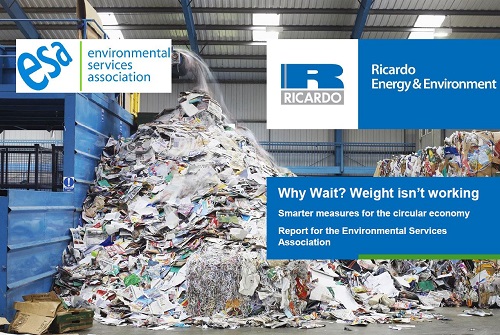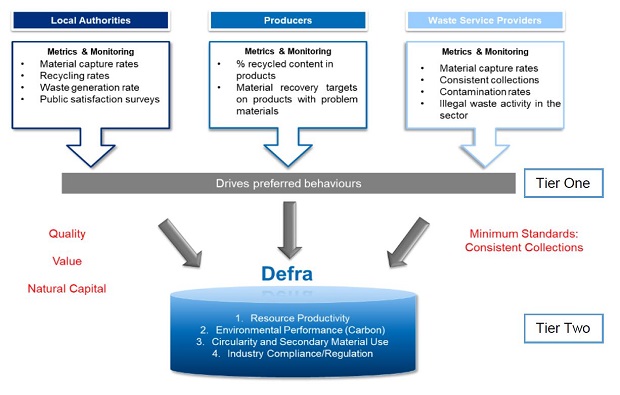A report commissioned by the ESA has criticised weight-based targets as a way of measuring recycling performance and is calling for a more “sophisticated” method.
The report, written by Ricardo and published today (20 August), instead proposes a “dashboard of metrics” targeted at different stakeholders in the lifecycle of products.

The report for ESA looks at what it will take to meet the recycling targets proposed within the EU’s Circular Economy Package
‘Smarter Measures for the Circular Economy’ is the second of two reports looking at what it will take to meet the recycling targets proposed within the EU’s Circular Economy Package (see letsrecycle.com story).
Weight
According to the report, weight-based targets have led to councils “chasing” heavier waste materials, such as garden waste, which there may not be the greatest environmental benefits in collecting.
Garden waste can be composted at home which would reduce HGV movements for collections, the report explains.
It is also claimed that the focus on quantity can mean that the quality of materials is compromised.
The report accepts that weight-based targets will need to be met in line with the requirements of the CEP and that the waste management system “will continue to be weight based”. However, it states that a dashboard of metrics “would allow different actors across the value chain to play their part in improving the environment, demonstrating their input and responsibilities”.
Behaviours
Some of the behaviours which Ricardo says the system should try to encourage, include designing materials for recyclability, increased use of recycled content in products, waste minimisation (especially organics), and consistent collections of materials, amongst others.
The report suggests, at a national level, a number of metrics will need to be reported. These include an economic target; carbon as a way of measuring environmental performance; circularity and secondary material use; and, industry compliance/regulation, monitored by the EA and local authorities.
The majority of the metrics proposed can be reported using existing systems, the report states, “with secondary levels of analysis able to be overlaid to provide a greater depth of understanding of the carbon embedded in the existing schemes”.
Other measures discussed in the document include individual targets for separate material streams, instead of an absolute target for recycling, linked to the best environmental option for that particular material.
Emphasis is also placed on producer responsibility which is identified as a “key aspect of any move to a more sophisticated metric for environmental performance”.
‘“Current EU waste policy measures success or failure on the basis of how heavy something is when it is recycled.”
ESA
Jacob Hayler
‘Value’
Commenting on the report launch, Jacob Hayler, ESA’s executive director said: “Current EU waste policy measures success or failure on the basis of how heavy something is when it is recycled. There is clearly scope in a post-Brexit world for us to do something much smarter which actually focuses properly on environmental outcomes and enables us to capture more value from our waste resources.
“This report examines how we could bring this about in practice. It offers a clear and pragmatic route-map for introducing new metrics alongside our current weight based system, which could offer us the future flexibility to phase out the most problematic materials and de-carbonise our waste and recycling systems most effectively.”
Report
The report was authored by Josephine Brown, Jamie Warmington and John Woodruff from Ricardo Energy & Environment.
The full report can be found here.
The post ESA report backs ‘smarter’ recycling targets appeared first on letsrecycle.com.
Source: letsrecycle.com General




